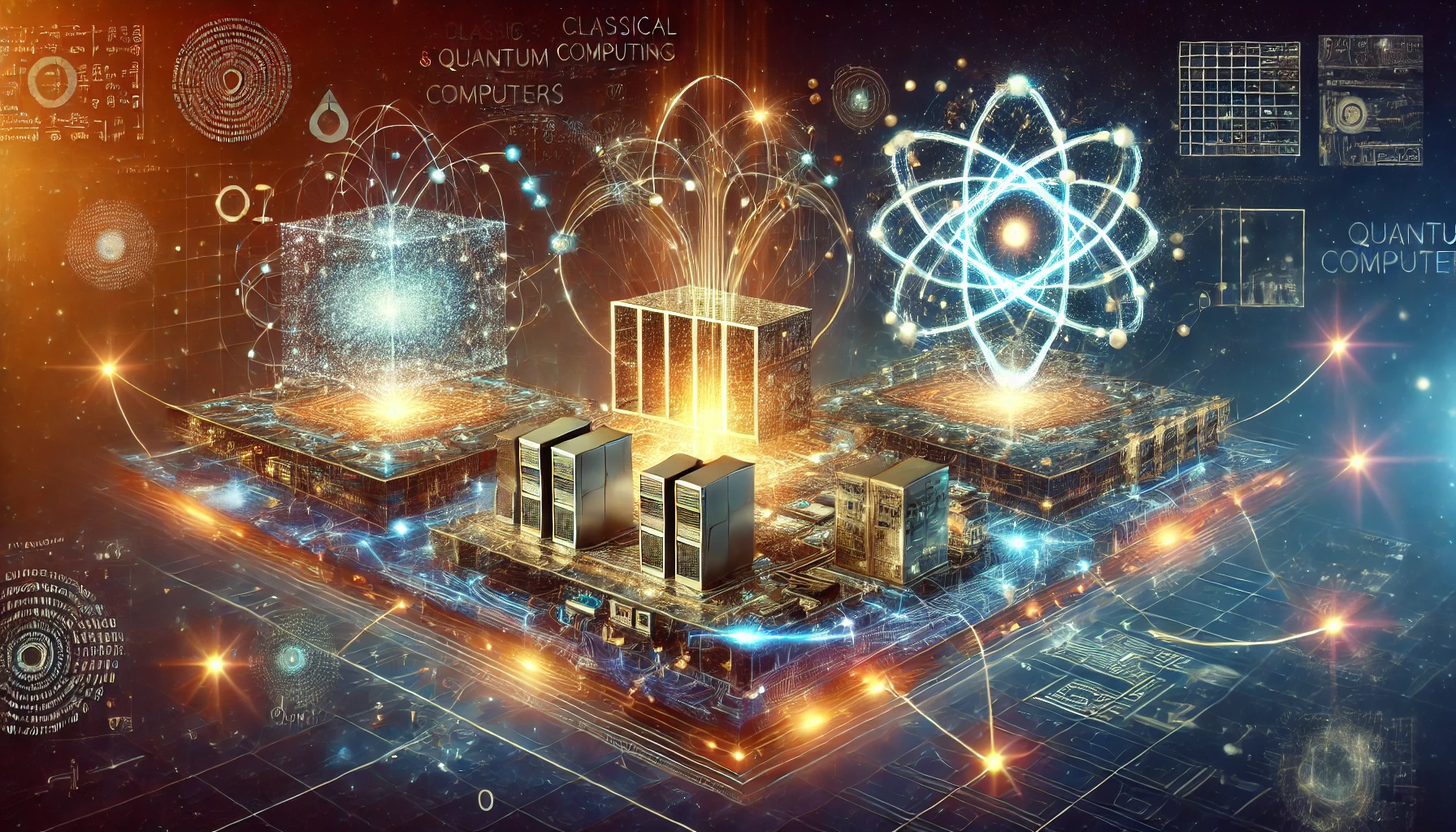Hybrid Computing: The Best of Both Worlds
Computers have become an essential part of our lives, helping us with everything from sending emails to solving complex scientific problems. However, different types of computers excel at different tasks. Traditional computers, also known as classical computers, are great for everyday tasks like browsing the internet and running software applications. On the other hand, quantum computers are designed to tackle highly complex problems at lightning speed. But what if we could combine the strengths of both?
This is where hybrid computing comes in. Hybrid computing is an advanced technology that blends the capabilities of classical and quantum computers to create a more powerful and efficient system. In this article, we will explore hybrid computing, how it works, and real-world examples of its applications.
What is Hybrid Computing?
Hybrid computing refers to a system that combines multiple computing approaches to optimize performance, speed, and efficiency. In most cases, it involves integrating traditional computing (which processes data using binary code) with advanced computing models like quantum computing, cloud computing, or artificial intelligence (AI).
The idea behind hybrid computing is simple: some tasks are better suited for classical computers, while others require the extraordinary power of quantum or AI-driven computing. By combining these different types of computing, hybrid systems can handle a wider range of tasks with greater efficiency.

How Does Hybrid Computing Work?
To understand hybrid computing, let’s compare it to a team of workers:
A classical computer works like a highly organized office worker who follows a step-by-step process to complete tasks.
A quantum computer acts like a super-intelligent scientist who can analyze multiple possibilities at once and find the best solution.
Hybrid computing is like having both the office worker and the scientist on the same team, working together to solve problems more effectively.
Hybrid computing allows classical and quantum computers to communicate with each other. When a problem arises, the system decides which part of the problem should be solved using classical methods and which part should be processed using quantum computing. The results are then combined to provide a final answer.
Types of Hybrid Computing
There are different types of hybrid computing, depending on the combination of technologies used. Here are some of the most common types:
Classical-Quantum Hybrid Computing
This is the most common type of hybrid computing, where classical computers handle general tasks while quantum computers solve complex calculations.
Example: Google’s quantum computer, Sycamore, works alongside traditional supercomputers to solve advanced mathematical problems.
Cloud-Based Hybrid Computing
In this model, local computers work alongside cloud-based supercomputers to enhance computing power.
Example: Many businesses use hybrid cloud computing to process large amounts of data without overloading their local machines.
AI-Powered Hybrid Computing
This model integrates artificial intelligence with classical computing to improve decision-making and automation.
Example: Self-driving cars use AI-driven hybrid computing to analyze traffic conditions and make split-second decisions.
Real-World Applications of Hybrid Computing
Hybrid computing is already being used in various industries to solve real-world problems. Let’s look at some examples:
1. Healthcare
Drug Discovery: Scientists use hybrid computing to speed up the process of finding new medicines. Classical computers analyze patient data, while quantum computers simulate how different molecules interact with the human body.
Medical Imaging: AI-powered hybrid systems help doctors detect diseases like cancer more accurately by analyzing medical scans.
2. Finance
Stock Market Predictions: Financial institutions use hybrid computing to analyze vast amounts of stock market data and make investment decisions.
Fraud Detection: AI-driven hybrid computing systems detect fraudulent transactions by identifying unusual patterns in banking activity.
3. Weather Forecasting and Climate Science
Hybrid computing helps meteorologists predict extreme weather events like hurricanes and tsunamis by analyzing real-time weather data.
Scientists use hybrid computing to study climate change and develop solutions for reducing carbon emissions.
4. Manufacturing and Industry
Predictive Maintenance: Hybrid computing helps factories predict when machines need maintenance, preventing costly breakdowns.
Automation: AI-powered hybrid systems improve the efficiency of robotic assembly lines in car manufacturing.
5. Cybersecurity
Hybrid computing enhances cybersecurity by using AI to detect and respond to cyber threats in real time.
Quantum-enhanced encryption ensures that sensitive data remains secure against hacking attempts.
Benefits of Hybrid Computing
Hybrid computing offers several advantages over traditional computing methods:
Speed and Efficiency: By combining classical and quantum computing, hybrid systems solve problems faster and more accurately.
Scalability: Hybrid computing allows businesses to expand their computing power as needed without requiring expensive hardware upgrades.
Cost-Effectiveness: Companies can save money by using hybrid cloud computing instead of investing in costly data centers.
Better Decision-Making: AI-powered hybrid computing improves decision-making in fields like healthcare, finance, and logistics.
Security and Reliability: Hybrid computing enhances data security by integrating advanced encryption and real-time threat detection.
Challenges of Hybrid Computing
While hybrid computing is a promising technology, it also has some challenges:
Complexity: Integrating different computing models requires advanced technology and expertise.
High Costs: Quantum computers and AI-driven computing systems are expensive to develop and maintain.
Data Transfer Issues: Hybrid computing relies on fast communication between different computing systems, which can sometimes lead to delays.
Hybrid computing offers several advantages over traditional computing methods:
Speed and Efficiency: By combining classical and quantum computing, hybrid systems solve problems faster and more accurately.
Scalability: Hybrid computing allows businesses to expand their computing power as needed without requiring expensive hardware upgrades.
Cost-Effectiveness: Companies can save money by using hybrid cloud computing instead of investing in costly data centers.
Better Decision-Making: AI-powered hybrid computing improves decision-making in fields like healthcare, finance, and logistics.
Security and Reliability: Hybrid computing enhances data security by integrating advanced encryption and real-time threat detection.
The Future of Hybrid Computing
The future of hybrid computing looks bright, with several developments on the horizon:
Advancements in Quantum Computing: As quantum computers become more powerful, hybrid computing will unlock new possibilities in scientific research, cryptography, and artificial intelligence.
Integration with 5G and Edge Computing: Combining hybrid computing with 5G and edge computing will allow real-time data processing for applications like smart cities and autonomous vehicles.
Expansion in AI and Machine Learning: AI-powered hybrid computing will continue to revolutionize industries by improving automation and decision-making.
Personal Hybrid Computing: In the future, individuals may have access to hybrid computing solutions on their personal devices, enabling faster and more efficient computing experiences.
Conclusion
Hybrid computing is revolutionizing the world of technology by combining the best features of classical, quantum, cloud, and AI-driven computing. By leveraging the strengths of multiple computing models, hybrid systems can solve complex problems faster, improve decision-making, and enhance security. As advancements in quantum computing, AI, and cloud technology continue to evolve, hybrid computing will play an even bigger role in shaping the future.
Whether in healthcare, finance, cybersecurity, or climate science, hybrid computing is opening new doors for innovation. As the technology matures, we can expect even more groundbreaking applications that will change the way we interact with computers and data.






